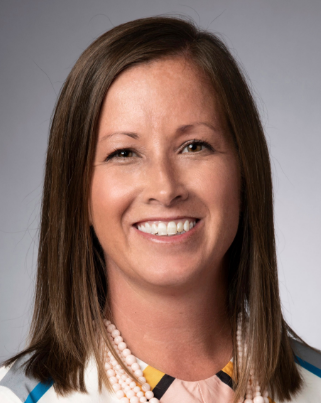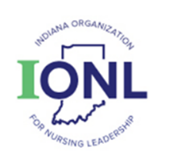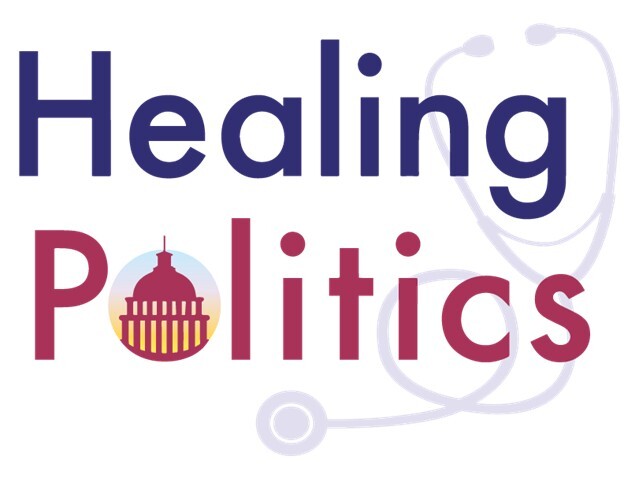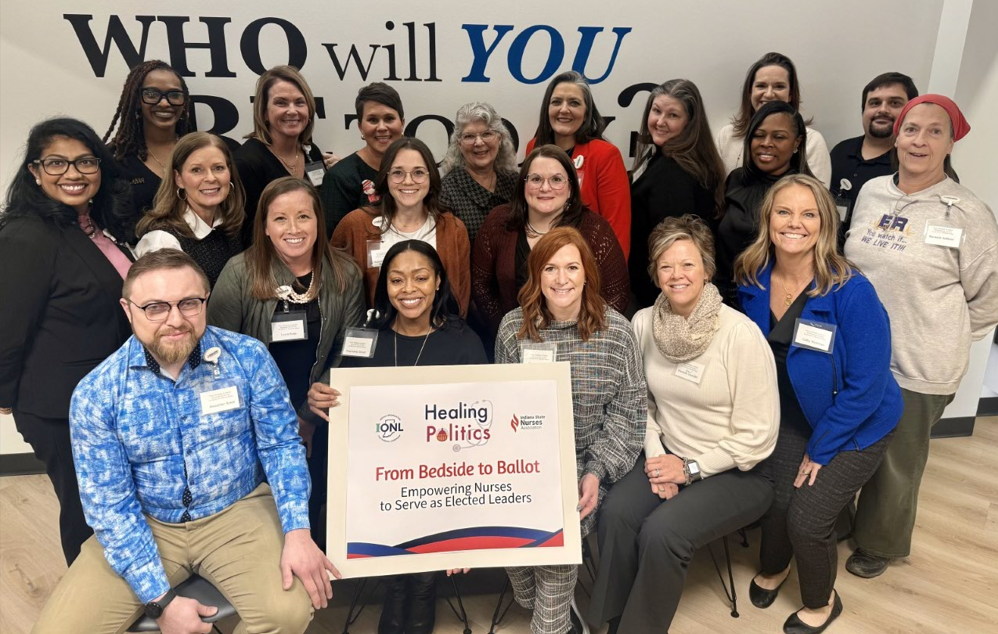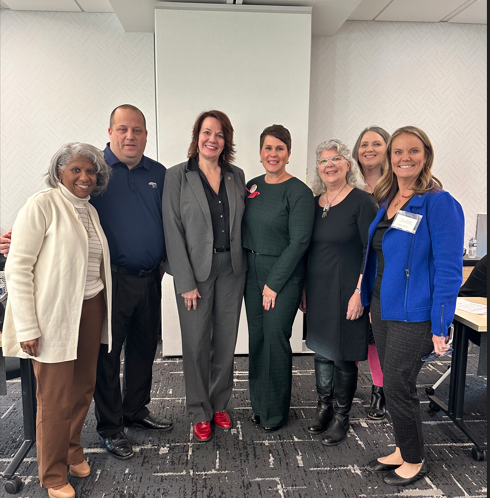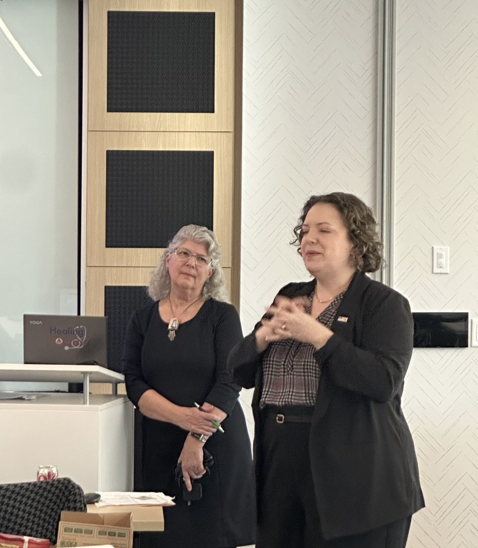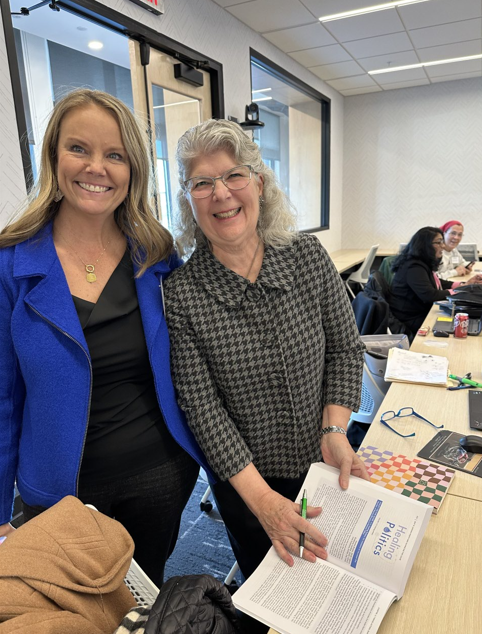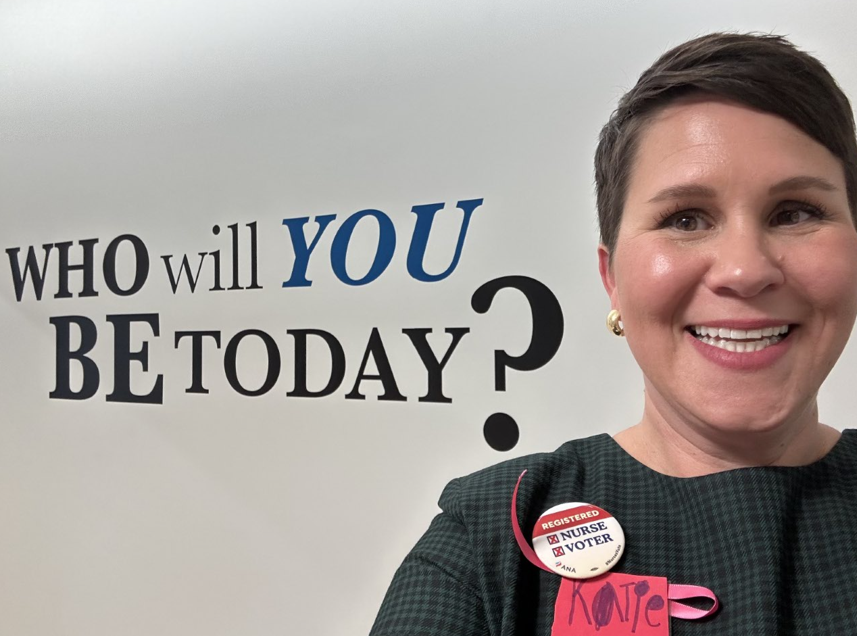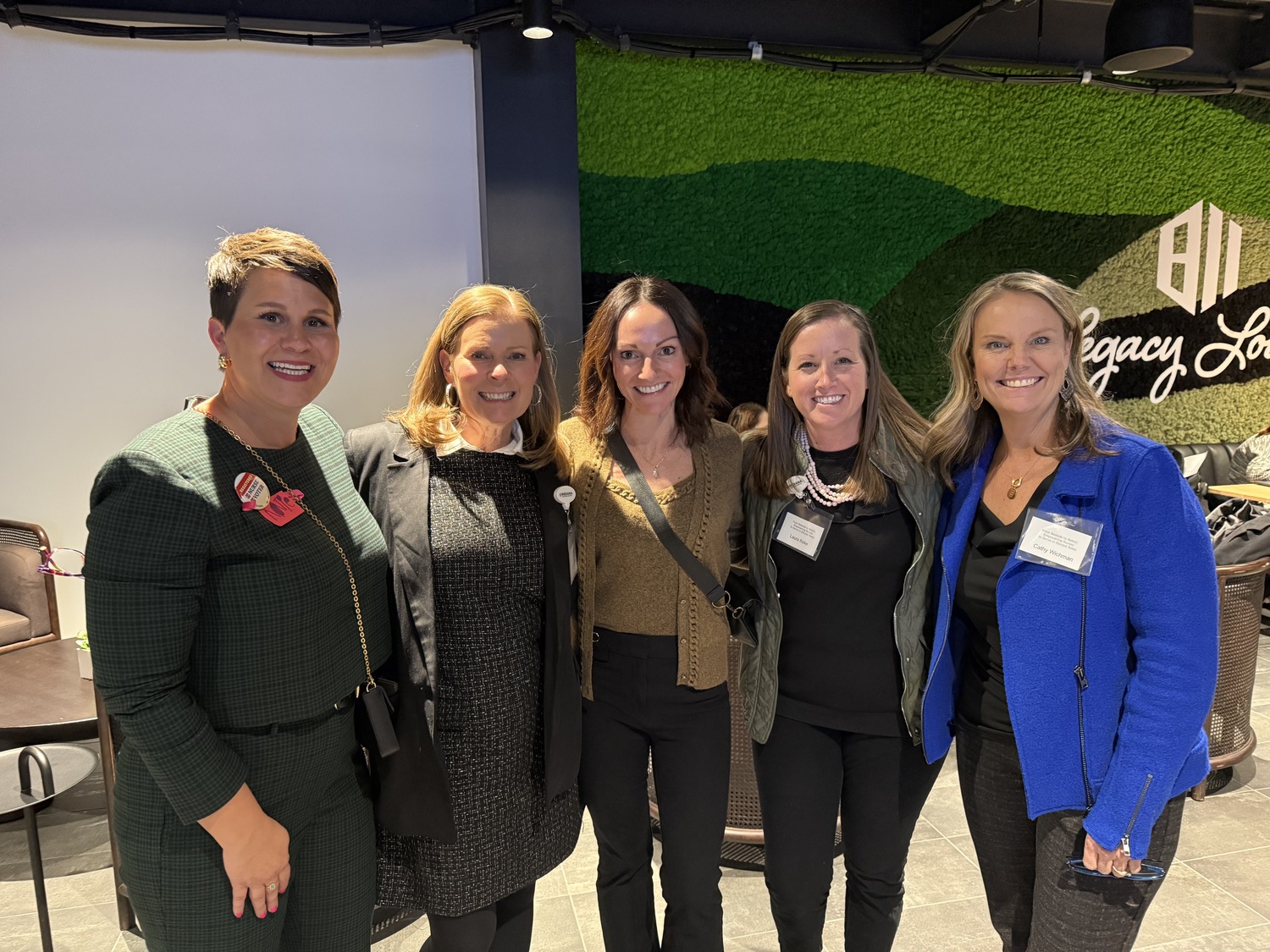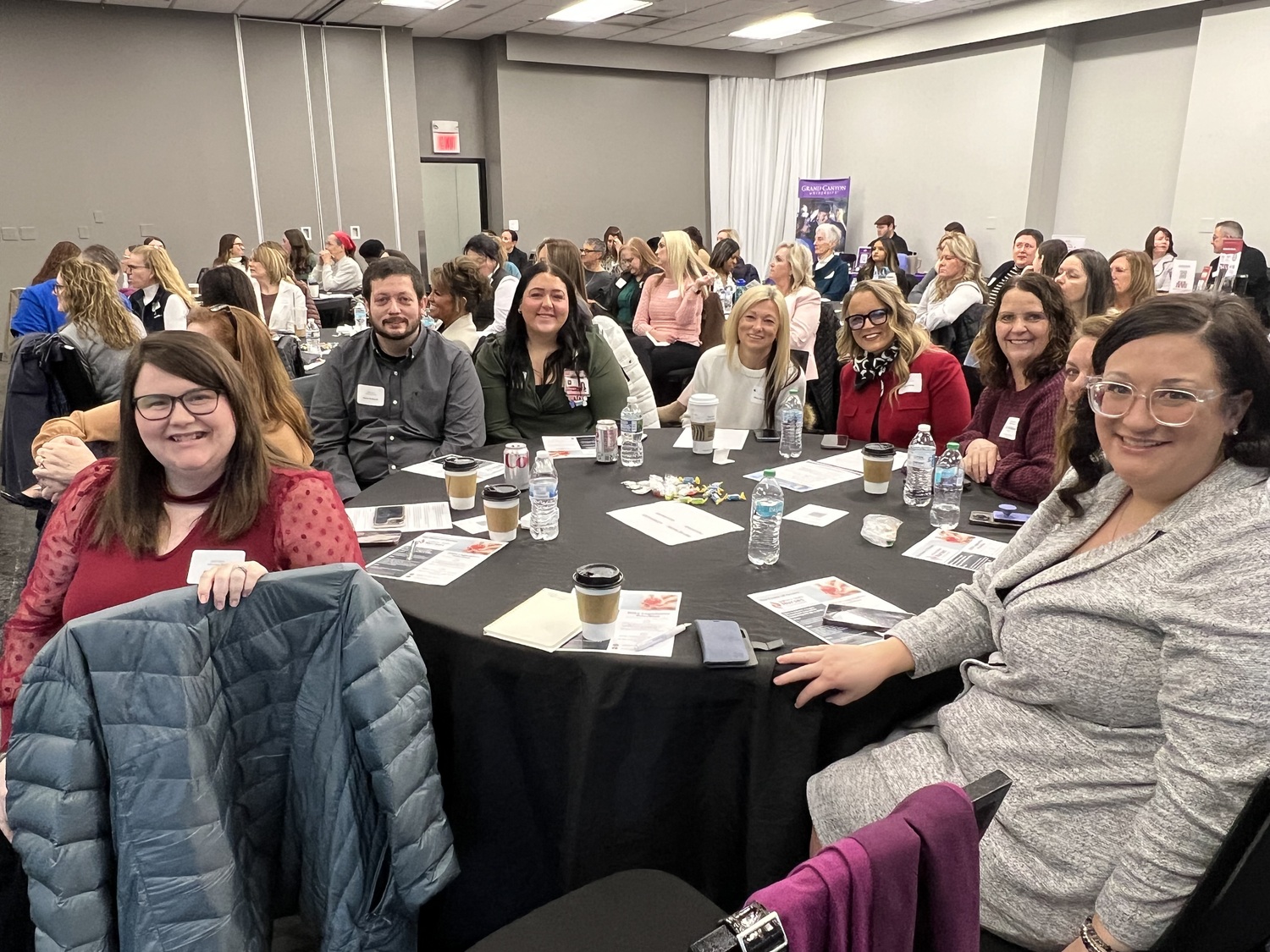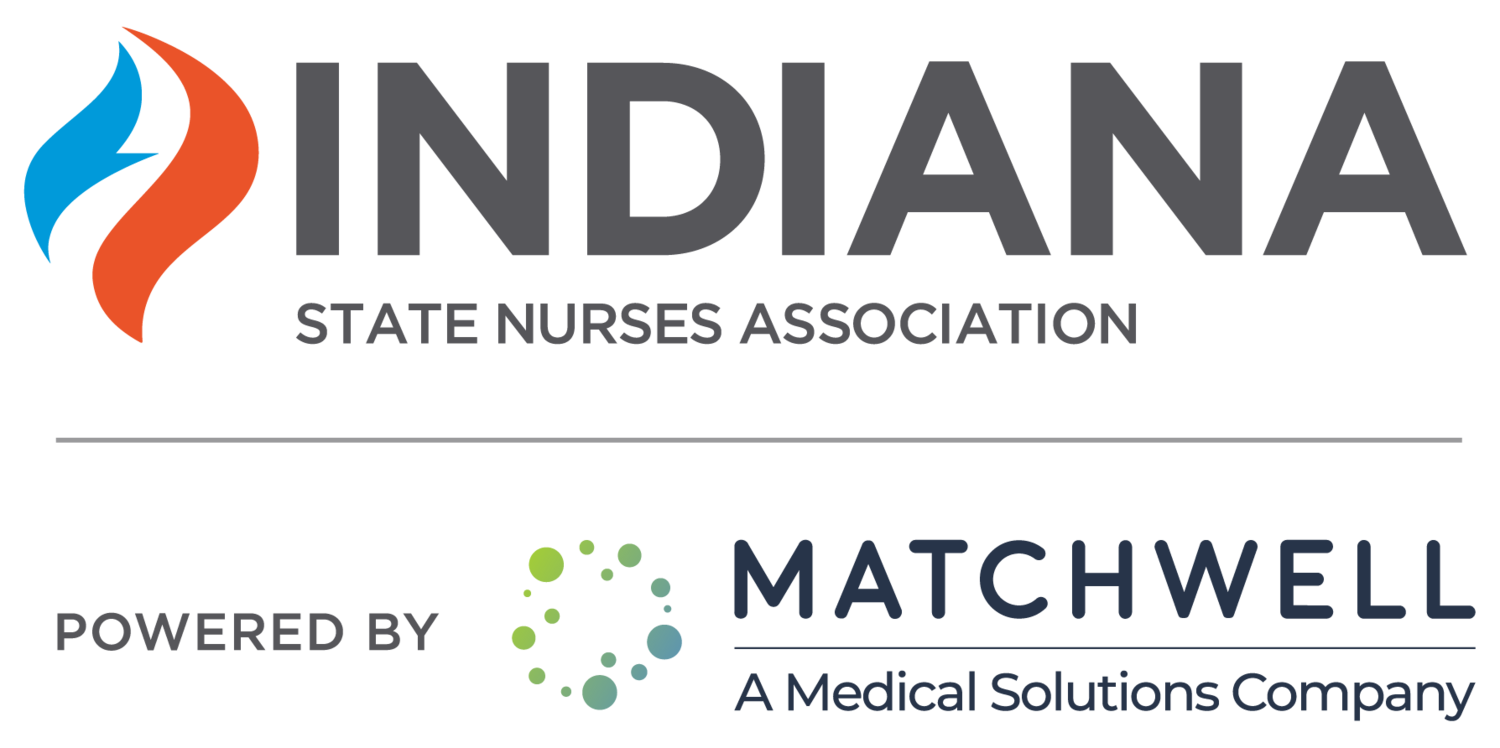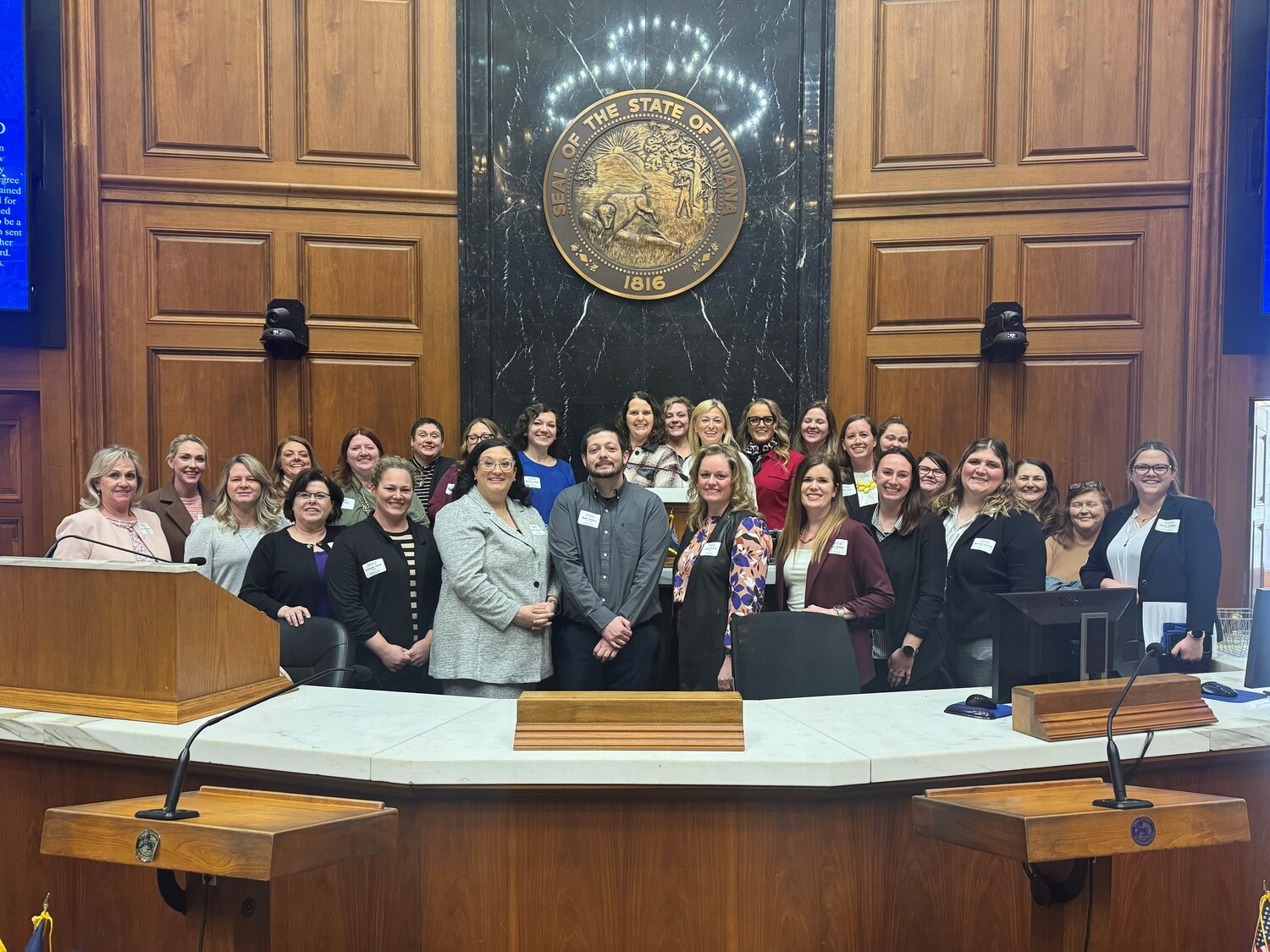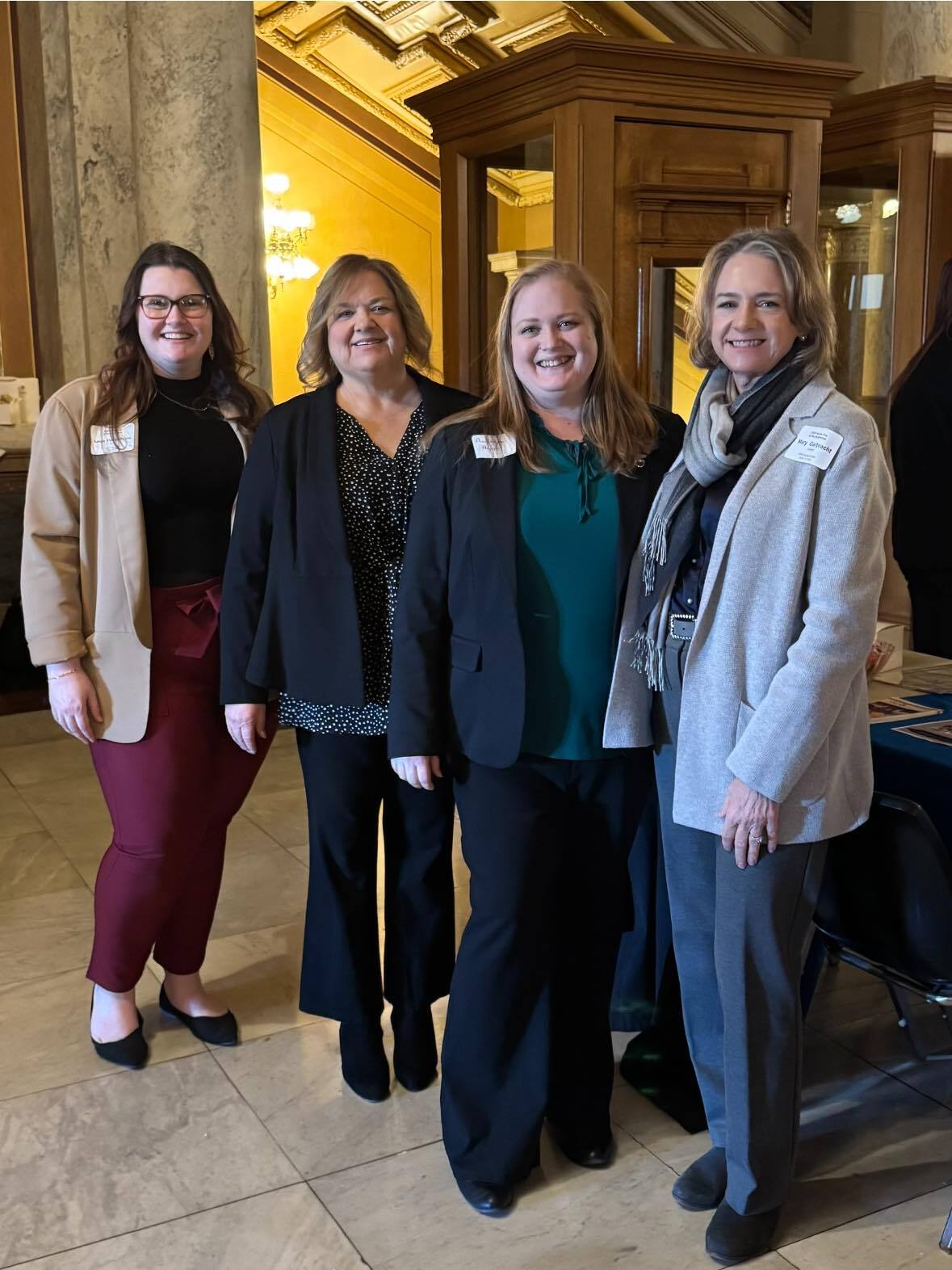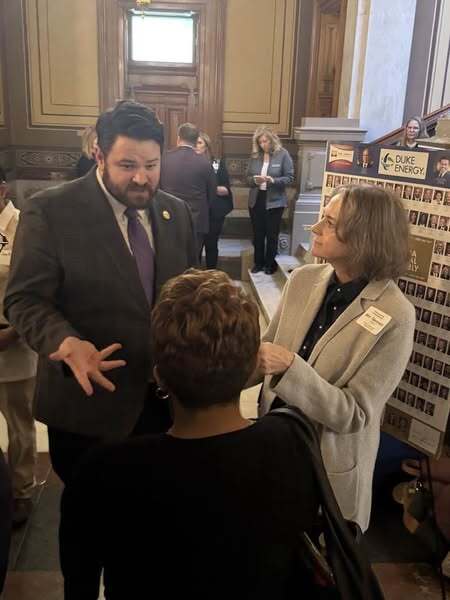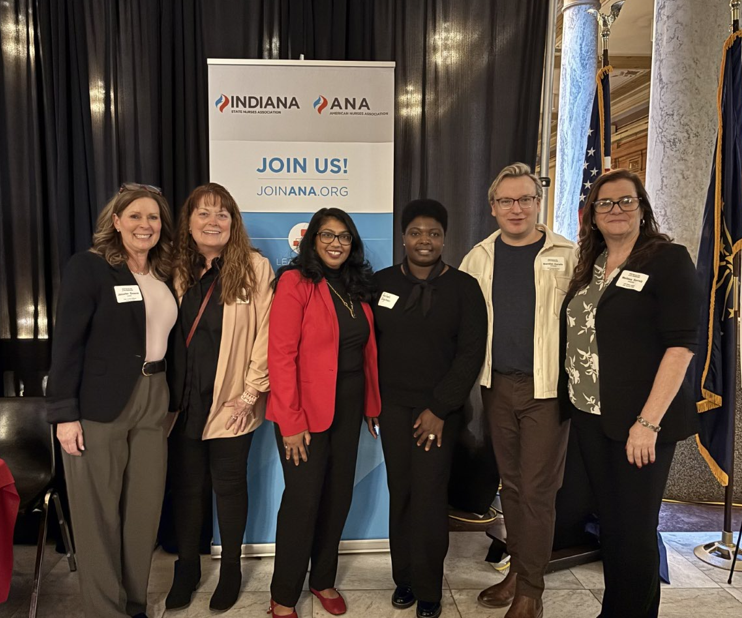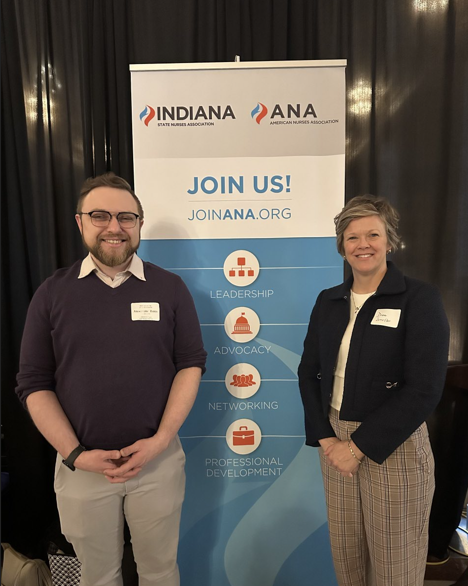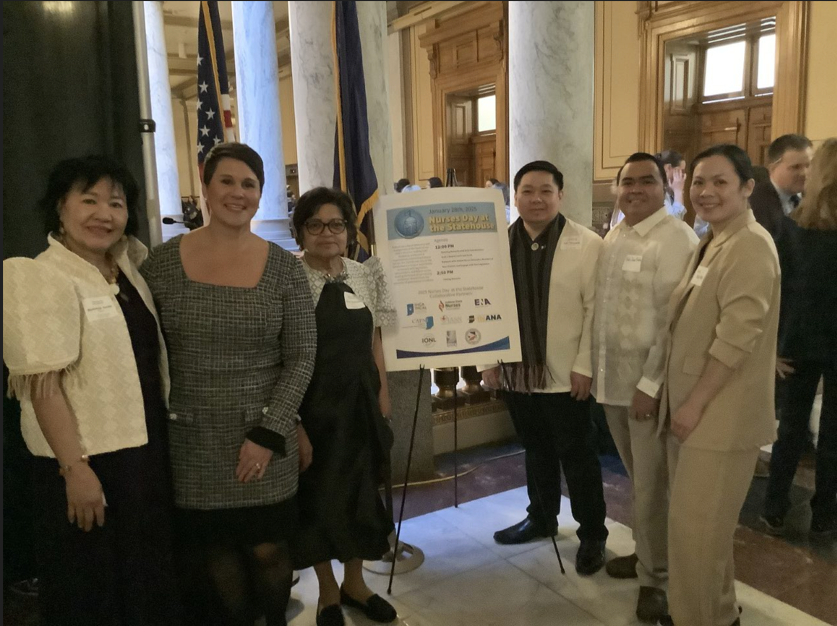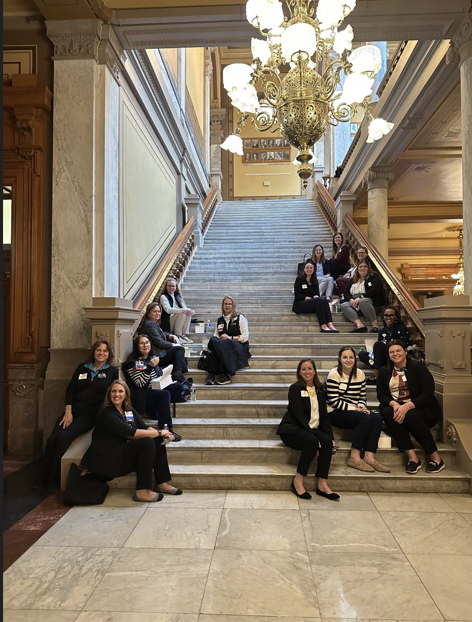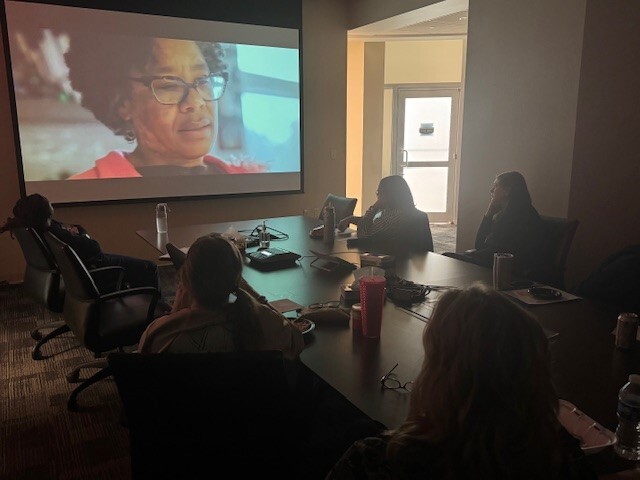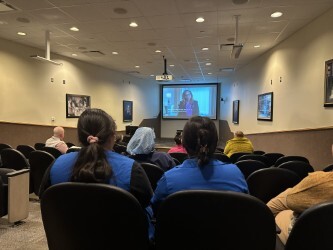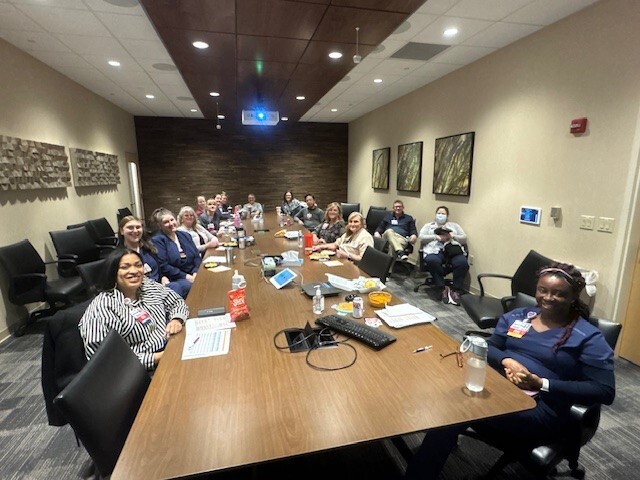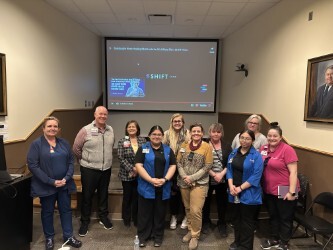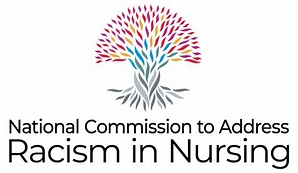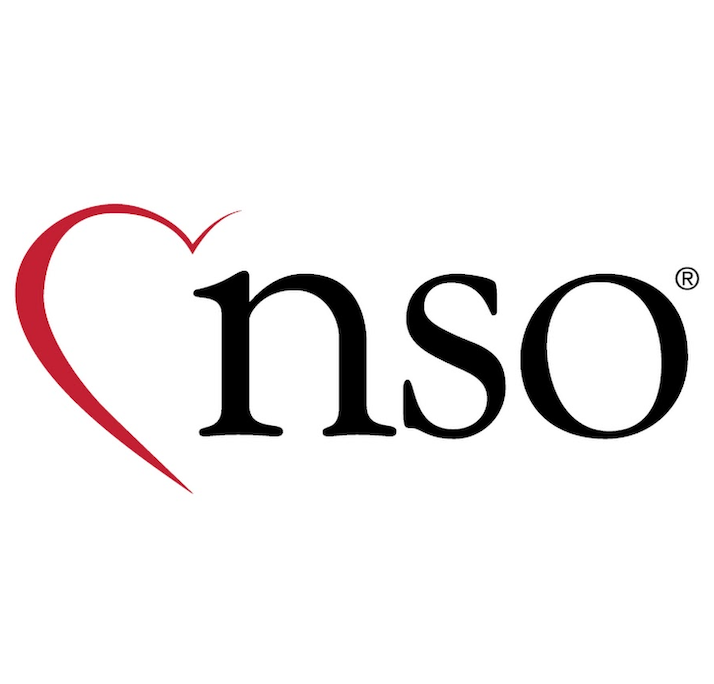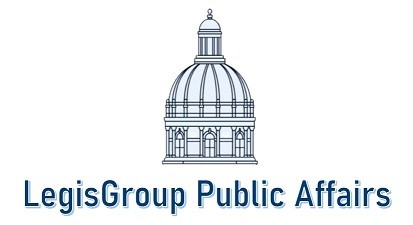
The 2025 Indiana General Assembly session is moving along quickly. We have just finished the mid mark for the session including the deadline for bills to pass out of committee in their chamber of origin. Soon the House committees take up bills passed by the Senate and the Senate committees take up bills passed by the House. April 29th is the last day for both chambers to pass bills within the 2025 session.
ISNA has been active at the Statehouse advocating on behalf of Indiana’s 183,000 nurses. Rhonda Cook, ISNA Lobbyist from LegisGroup Public Affairs, keeps us up to date in real time as she spends most of her days during the session at the Statehouse. As ISNA's lobbyist, she assists with relationship building, provide guidance in drafting testimony, and grassroots outreach. When an ISNA representative is not available to testify, Rhonda serves as our liaison.
Each week Rhonda meets with ISNA leadership and interns to keep us informed of bill movement, dialogue occurring at the Statehouse, and guidance for next steps. As the 2025 session started, we were following over 150 bills related to nursing and healthcare. Rhonda keeps us focused and on track.
ISNA members receive weekly emails detailing what is happening at the Statehouse. Our Advocacy Council meets monthly to discuss these issues and develop ISNA positions. If you have questions or comments on these efforts or any of the bills listed here, please contact Katie Feley.
As of the last week in February we are watching the following active bills:
HB1001 STATE BUDGET (THOMPSON J) This legislation allocates state funding for operations, education, Medicaid, and economic initiatives. It expands tax exemptions, increases tax deductions and credits, adjusts law enforcement salaries, and modifies education funding rules. It extends health facility fees, removes income limits for choice scholarships, and mandates higher education facility reports. The bill also revises tax policies for development districts, establishes a reserve fund, and reallocates state funds, including transfers to the tobacco settlement fund.
HB1003 HEALTH MATTERS (BARRETT B) This bill strengthens Medicaid fraud investigations, expands data-sharing for enforcement, and enhances transparency in healthcare billing and pricing. It mandates equal reimbursement rates for outpatient and physician office services, establishes quality metrics for long-term care, and promotes best practices in prior authorization. The bill also enforces 340B drug pricing rules, requires hospitals to disclose billing practices, and limits out-of-network reimbursement rates. It improves prior authorization policies, mandates good faith estimates for medical costs, and enhances consumer access to pricing information. Additionally, it streamlines provider credentialing and protects patient access to independent physicians.
HB1004 NONPROFIT HOSPITALS (CARBAUGH M) This bill imposes an excise tax on hospital facility fees exceeding 265% of Medicare rates, excluding critical access hospitals. Revenue supports Medicaid and rural healthcare workforce development. It establishes a hospital payment program and managed care fee, pending federal approval. Nonprofit hospitals must report pricing data and are audited annually. Hospitals charging over 300% of Medicare rates risk losing nonprofit status but may regain it. The bill also mandates transparency in nonprofit hospital finances and appropriates funds for enforcement.
HB1024 MEDICAID REIMBURSEMENT FOR CHILDREN'S HOSPITALS (SLAGER H) Removes the expiration date of language specifying Medicaid reimbursement for certain out of state children's hospitals.
HB1051 MOBILE INTEGRATION HEALTHCARE GRANTS (PRESSEL J) Provides that an emergency medical services provider agency that is operated by a county is eligible for a mobile integration healthcare grant.
HB1056 CONTROLLED SUBSTANCES (MCNAMARA W) Adds additional substances to the list of controlled substances.
HB1065 CANCER CLINICAL TRIAL PROGRAM (SHACKLEFORD R) Allows an organization or entity to establish and administer a cancer clinical trial participation program for the purpose of providing payments to a participant for certain costs incurred by the participant while participating in a cancer clinical trial. Sets forth program requirements and participant eligibility.
HB1118 CRITICAL INCIDENT STRESS MANAGEMENT DEBRIEFINGS (MCNAMARA W) Provides that a first responder recipient of critical incident stress management (CISM) services may not be compelled to testify or otherwise disclose a communication made to a CISM services provider or peer support team member relating to the first responder recipient's CISM services in a civil, criminal, or administrative proceeding. Provides that a first responder recipient or the first responder recipient's employer may not be held liable for damages for any act, error, or omission committed by the first responder recipient based on a communication provided between a first responder recipient and CISM team, CISM services provider, or peer support team as part of the CISM services unless the act, error, or omission constitutes wanton, willful, or intentional misconduct.
HB1200 OPIOID PRESCRIPTIONS (BEHNING R) Provides that if a prescriber issues a prescription for an opioid for administration through an intrathecal pump or epidural pain pump: (1) the prescription may not exceed a 180 day supply; and (2) the patient may not be required to have a face-to-face visit with the prescriber more than once every 180 days unless the prescriber determines an earlier follow up visit is medically necessary.
HB1226 MEDICARE SUPPLEMENT INSURANCE (DANT CHESSER W) Prohibits an issuer of a Medicare supplement policy or certificate from denying, conditioning the issuance or effectiveness of, or discriminating in the pricing of a Medicare supplement policy or certificate because of the health status, claims experience, receipt of health care, or medical condition of an applicant who meets certain conditions.
HB1241 TRAUMA INFORMED CARE (SUMMERS V) Establishes the trauma informed care commission (commission). Provides that the commission shall identify, evaluate, and make recommendations regarding best practices and research models with respect to children, youth, and families who have experienced trauma. Requires the commission to submit a report to the office of the secretary of family and social services and to the general assembly. Urges the legislative council to assign to an appropriate study committee the task of studying various issues regarding teachers and education.
HB1273 CHILD WELFARE TASK FORCE (DEVON D) Establishes the child welfare task force (task force) to study specified topics regarding child welfare services in Indiana. Requires the task force to submit a report not later than October 15, 2026, and not later than October 15, 2027, for review by the interim study committee on child services.
HB1297 MOTOR VEHICLE MEDICAL INFORMATION PROGRAM (ERRINGTON S) Establishes the yellow dot motor vehicle medical information program. The yellow dot motor vehicle medical information program is established for the purpose of providing emergency medical responders with critical medical information in the event of a motor vehicle accident or emergency situation involving a program participant. The contact information for not more than two (2) emergency contacts for the program participant. The program participant's medical information, including medical conditions, recent surgeries, allergies, and current medications. The program participant’s hospital preference. Contact information for not more than two (2) physicians of the program participant.
HB1354 VETERINARY MEDICINE (AYLESWORTH M) Amends the licensure applicability provision for veterinarians to include registration and permits for veterinary technicians. Requires certain individuals to submit to both a state and national background check. Allows the state police department to release the results of a national criminal history background check to an authorized employee of the board of animal health. Makes a technical correction.
HB1376 EMERGENCY MEDICATION (BOY P) Amends the definition of "emergency medication" by deleting the term “Naloxone” and replacing with ”A federal Food and Drug Administration
8 approved opioid overdose reversal medication, including nasal spray, as an overdose intervention drug that is subject to IC 16-42-27” in addition to Albuterol and Epinephrine, already listed.
HB1385 HEALTH CARE FACILITY EMPLOYEES (BASCOM G) Provides an exception “unless the person is certified as a peer recovery coach through a credential recognized by the division of mental health and addiction” to the disqualifying conditions for a felony offense relating to controlled substances within the previous five (5) years for a nurse aide or other unlicensed employee.
HB1391 SERVICES FOR THE AGED AND DISABLED (CLERE E) This bill updates the definition of "community and home care services" under the CHOICE program, removes Medicaid waiver certification requirements for providers, and prioritizes CHOICE funding for specific individuals. It requires consideration of provider availability in rate negotiations and establishes a Medicaid diversion pilot program to assess home modifications and telehealth in reducing costs. It also allows contracting for level-of-care assessments under certain Medicaid programs and permits a study on realigning area agency service regions.
HB1412 REPORTING OF CHILD ABUSE OR NEGLECT (CASH B) Provides that an individual's duty to report suspected child abuse or neglect is may only be delegated to another person if certain conditions are met. Requires that if a report of suspected child abuse or neglect alleges that a staff member, youth coach, or volunteer of an institution, school, facility, organization, or agency is the abuser, local law enforcement shall investigate to determine whether the institution, school, facility, organization, or agency knew that the alleged abuse was happening and failed to report the alleged abuse. Allows law enforcement to consider certain facts when determining whether the institution, school, facility, organization, or agency knew about the alleged abuse. Increases the penalty for failure by a member of the staff of a public or private institution, school, facility, organization, or agency to report suspected child abuse or neglect to a Class A misdemeanor (instead of a Class B misdemeanor, under current law), and increases the penalty to a Level 6 felony if the person has a prior conviction for failure to report abuse or neglect. Makes conforming changes.
HB1453 PEDIATRIC CANCER RESEARCH AND TREATMENT GRANT (O'BRIEN T) Establishes the pediatric cancer research and treatment grant program (grant program) to be administered by the Indiana department of health (state department). Establishes the pediatric cancer research and treatment fund. Sets forth requirements for an entity to receive a grant. Requires the state department to develop criteria, policies, procedures, and a plan concerning awarding of the grants. Prioritizes use of the funds to be on innovative research and treatments with the potential of resulting in novel therapies for pediatric cancer. Requires the state department to submit an annual report to the governor and legislative council concerning the grant program and publish the report on the state department's website.
HB1457 INDIANA DEPARTMENT OF HEALTH (BARRETT B) This bill updates regulations for the Indiana Department of Health, including administrative procedures for resident transfers, hospital licensure enforcement, and background checks for healthcare workers. It strengthens oversight of nurse and home health aides, sets penalties for ineligible job applicants, and refines WIC vendor selection criteria. The bill also updates death record procedures for stillbirths, expands data sharing with child fatality review teams, revises epinephrine training approval, and modifies the membership of the statewide child fatality review committee.
HB1474 FSSA MATTERS (BARRETT B) This bill defines and updates regulations for Medicaid home and community-based services (HCBS) waivers, setting provider requirements and reimbursement rules. It relocates provisions for assisted living services, mandates annual assessments of state savings, and revises appeals processes for service eligibility. It requires Medicaid-paid attendant care providers to register with the state and broadens the role of the statewide waiver ombudsman to include all disability services. The bill also updates interpreter standards for the deaf and hard of hearing, removes outdated provisions, and makes technical corrections.
HB1555 LICENSURE OF FOREIGN TRAINED PHYSICIANS (BAIRD B) Establishes a limited medical license for individuals who: (1) have graduated from certain international medical programs; (2) obtain a health care facility sponsor in an underserved area; and (3) meet certain other criteria. Provides that a limited medical license authorizes the recipient to practice medicine or osteopathic medicine only at a health care facility in an underserved area. Enables the medical licensing board of Indiana (board) to revoke a limited medical license if the recipient stops working as a physician at a health care facility in an underserved area. Provides that a limited medical license may be converted to an unlimited license at the discretion of the board after five years.
HB1572 HEARING AIDS AND SPEECH-LANGUAGE PATHOLOGISTS (GOSS-REAVES L) Adds speech-language pathology assistant to the definition of "practitioner" for purposes of the provision of telehealth. Specifies services included in the definition of "audiology". Allows for the sale, use, provision of customer service, or distribution of an over-the-counter hearing aid without the fitting of the hearing aid by a hearing aid dealer who has been issued a certificate of registration or a licensed audiologist. (Current law does not differentiate between a prescription hearing aid and an over-the-counter hearing aid concerning the fitting of the hearing aid.)
HB1587 INSURANCE MATTERS (CARBAUGH M) This bill expands reimbursement for emergency medical services to include mobile integrated healthcare programs. It allows managed care organizations and providers to negotiate emergency service payment rates but permits the secretary of family and social services to void agreements that negatively impact the Medicaid budget. It exempts certain 501(c)(4) organizations from consumer data protection laws, extends the deadline for the Indiana Public Employers' Plan to apply for a certificate of authority, repeals the requirement for annual public insurance forums, updates the definition of "small employer" in health insurance regulations, and allows legal custodians to settle claims on behalf of minors under specific conditions.
HB1595 LONG TERM CARE INSURANCE PARTNERSHIP PROGRAM (CARBAUGH M) Requires the office of the secretary of family and social services to reapply before September 1, 2025, for a Medicaid state plan amendment that provides for the establishment of the long term care partnership program and the discontinuance of the current long term care program.
HB1604 OUT-OF-POCKET EXPENSE CREDIT (MCGUIRE J) Requires a health plan to credit toward a covered individual's deductible and annual maximum out-of-pocket expenses any amount the covered individual pays directly to any health care provider for a medically necessary covered health care service if a claim for the health care service is not submitted to the health plan and the amount paid by the covered individual to the health care provider is less than the average discounted rate for the health care service paid to a health care provider in the health plan's network. Requires a health plan to: (1) establish a procedure by which a covered individual may claim a credit; (2) identify documentation necessary to support a claim for a credit; and (3) publish average discounted rates that the health plan has negotiated to pay health care providers for health care services.
HB1666 OWNERSHIP OF HEALTH CARE PROVIDERS (MCGUIRE J) Requires reporting of certain ownership information by: (1) a health care entity to the Indiana department of health (state department); (2) a physician group practice to the professional licensing agency; and (3) an insurer, a third party administrator, and a pharmacy benefit manager to the department of insurance. Requires a hospital to include certain ownership information in the hospital's annual fiscal report to the state department. Requires the professional licensing agency and the department of insurance to provide the ownership information to the state department. Requires the state department to post the ownership information on the state department's website. Amends the definition of "health care entity" for provisions governing health care entity mergers and acquisitions. Establishes the health care entity merger approval board (board). Requires an Indiana health care entity that is involved in a merger or acquisition to provide notice to the office of the attorney general.
SB2 MEDICAID MATTERS (MISHLER R) Requires the office of the secretary of family and social services (office) to report specified Medicaid data to the Medicaid oversight committee. Requires the office to annually prepare and present a report to the budget committee concerning the enforcement of the Medicaid five year look back period. Prohibits specified persons from advertising or otherwise marketing the Medicaid program. Repeals language allowing for marketing of the Medicaid program. Requires the office to receive and review data from specified federal and state agencies concerning Medicaid recipients to determine whether circumstances have changed that affect Medicaid eligibility for recipients and to perform a redetermination. Requires the office to establish: (1) performance standards for hospitals that make presumptive eligibility determinations and sets out action for when hospitals do not comply with the standards; and (2) an appeals procedure for hospitals that dispute the violation determination. Sets out a hospital's responsibilities when making a presumptive eligibility determination. Imposes corrective action and restrictions for failing to meet presumptive eligibility standards. Specifies requirements, allowances, and limitations for the healthy Indiana plan.
SB74 EXTENSION OF LIFELINE LAW IMMUNITY (ALTING R) Provides that an individual who is: (1) reasonably believed to be suffering from a health condition which is the direct result of alcohol consumption; and (2) assisted by a person who requested emergency medical assistance for the individual; is immune from prosecution for certain crimes.
SB96 PHARMACIST ADMINISTRATION OF IMMUNIZATIONS (BECKER V) Allows a pharmacist to administer an immunization that is recommended by the federal Centers for Disease Control and Prevention Advisory Committee on Immunization Practices and approved by federal Food and Drug Administration to a group of individuals under a drug order, under a prescription, or according to a protocol approved by a physician if certain conditions are met. (Current law allows a pharmacist to administer specified immunizations to a group of individuals under a drug order, under a prescription, or according to a protocol approved by a physician if certain conditions are met.) Authorizes the commissioner of the Indiana department of health to remove during the legislative interim a vaccination from the list of vaccinations otherwise recommended and approved by the federal government. Provides that the commissioner's removal of the vaccination from the list is effective until the date that the general assembly adjourns sine die in the ensuing calendar year.
SB111 COVERAGE FOR LIVING ORGAN DONORS (CHARBONNEAU E) Prohibits an insurer that issues a policy of life insurance, disability insurance, or long term care insurance from taking certain actions with respect to the coverage of individuals who are living organ donors. Specifies that certain actions constitute an unfair and deceptive act and practice in the business of insurance when taken against a living organ donor by an insurer.
SB118 340B DRUG PROGRAM REPORT (CHARBONNEAU E) Requires an entity authorized to participate in the federal 340B Drug Pricing Program to annually report specified data to the Indiana department of health (state department). Requires the state department to submit a report of the aggregated data to the legislative council and post the report on the state department's website.
SB119 CERTIFICATE OF PUBLIC ADVANTAGE (CHARBONNEAU E) Prohibits the submission of an application for a certificate of public advantage (application) after February 15, 2025. Changes the time frame in which the Indiana department of health has to review and make a determination on an application filed during a specified time frame.
SB138 SALE OF LOW THC PRODUCTS TO PERSONS LESS THAN 21 (BOHACEK M) Makes possession of low THC hemp extract or a cannabinoid by a minor a Class B misdemeanor. Makes the sale of low THC hemp extract or a cannabinoid to a minor a Class A misdemeanor, and increases the penalty under certain circumstances. Prohibits the sale of a vapor product to a minor and the possession of a vapor product by a minor. Increases the penalty for certain infractions involving minors and tobacco or e-liquids containing nicotine.
SB140 PHARMACY BENEFITS (CHARBONNEAU E) Requires an insurer, a pharmacy benefit manager, or any other administrator of pharmacy benefits to ensure that a network utilized by the insurer, pharmacy benefit manager, or other administrator is reasonably adequate and accessible and file an annual report regarding the networks with the commissioner. Sets forth certain limitations and requirements with respect to the provision of pharmacy or pharmacist services under a health plan. Allows any insured, pharmacy, or pharmacist impacted by an alleged violation to file a complaint with the commissioner.
SB143 PARENTAL RIGHTS (BROWN L) Provides that a governmental entity may not substantially burden certain parental rights unless the burden, as applied to the parent and the child, is required to advance a compelling governmental interest and is the least restrictive means of advancing the governmental interest. Prohibits a governmental entity from: (1) advising, directing, or coercing a child to withhold certain information from the child's parent; or (2) denying a child's parent access to certain information. Allows a parent to bring an action against a governmental entity for certain violations and provides for certain relief. Specifies that the parent of a child does not have a right to access certain medical care on behalf of the child if the child does not have an affirmative right of access to the medical care.
SB147 PHYSICIAN REFERRALS AND REIMBURSEMENT RATES (BUSCH J) Prohibits, in accordance with the federal Stark Law (42 U.S.C. 1395nn), a referring physician from receiving compensation or an incentive from a health care entity or another physician, who is in the same health care network as the referring physician, for referring a patient to the health care entity or other physician. Provides that the attorney general may investigate certain complaints. Provides that the attorney general may cooperate with federal, state, and local law enforcement agencies in the investigation of certain complaints. Provides that the attorney general may take certain actions when conducting an investigation of certain complaints. Requires the all payer claims data base to publish the physician reimbursement rates as a separate line item for each contract instead of in the aggregate.
SB151 STATUTE OF LIMITATIONS (ALEXANDER S) Allows the prosecution of Level 3 felony rape and Level 3 and Level 4 child molesting offenses to be commenced at any time. Establishes a defense of laches for Level 3 felony rape and Level 3 and Level 4 felony child molesting if the state unreasonably delayed in filing charges and certain other conditions are met.
SB176 LICENSED PRACTICAL NURSES (YODER S) Removes the requirement that a state accredited program of practical nursing only accepts students who have a high school diploma or its equivalent. Requires that an individual applying for license to practice as a licensed practical nurse provide proof of having earned a high school degree or its equivalent to the state accredited program.
SB181 NURSE TRAINING IN TRAUMA INFORMED CARE (CRIDER M) Requires the state board of nursing to adopt or amend rules to require trauma informed care training as part of the required curriculum for nursing education programs.
SB182 ADULT PROTECTIVE SERVICES (CRIDER M) Specifies that the adult protective services reporting applies to reports received through a statewide toll free telephone call or through online reporting. Requires an adult protective services unit (unit) to investigate and determine whether a report is to be referred to law enforcement or another agency for investigation. Removes language specifying entities to be informed of an endangered adult report. Requires the unit to share appropriate information to coordinate and implement services.
SB216 MENTAL HEALTH PROFESSIONALS (CRIDER M) Makes the following changes in regard to marriage and family therapists, mental health counselors, addiction counselors, and clinical addiction counselors: (1) Provides that an individual must be licensed as an associate before obtaining the relevant experience hours, except in certain circumstances. (2) Clarifies the effect on experience hours of the expiration of a temporary license or permit. Removes certain provisions regarding first available examinations.
SB289 NONDISCRIMINATION IN EMPLOYMENT AND EDUCATION (BYRNE G) Establishes prohibitions and requirements on state agencies, state educational institutions, and health profession licensing boards regarding diversity, equity, and inclusion. Provides that certain civil actions for noncompliance may be filed against a state educational institution. Establishes requirements regarding a standardized admissions test for state educational institutions that offer certain health education programs. Provides that a school corporation, charter school, state agency, political subdivision, or an employee of a school corporation, charter school, state agency, or political subdivision may not, in the course or scope of public service or employment, promote, embrace, or endorse stereotypes. Establishes a process for an employee, a parent, or an emancipated student to file a complaint of a violation. Allows the attorney general to file an action for mandate to compel a school corporation, charter school, state agency, or political subdivision to comply with certain requirements.
SB359 STUDENT WELL-BEING AND RESILIENCY (ALEXANDER S) Requires the department of education (department), in consultation with the office of the secretary of family and social services, to approve and make available student mental well-being resources for certain schools. Requires the governing body of a school corporation or the equivalent authority for a charter school to publish and publicly post the approved student well-being resources. Establishes the resiliency program (program) to provide eligible schools the opportunity to participate in a program designed to help students build resiliency and grit so that students are ready to learn. Requires the department to develop guidelines to determine which eligible schools may participate in the program. Requires an eligible school selected by the department to participate in the program to follow certain requirements and procedures before a student may participate in the program. Requires the department to prepare a report concerning the program and submit the report to the legislative council.
SB365 EDUCATION MATTERS (RAATZ J) Requires the department of education (department), in collaboration with the commission for higher education (commission) and the department for workforce development, to create a combined return on investment report for specified programs. Requires the department, in collaboration with the commission and the department for workforce development, to collect and maintain certain data concerning the specified programs. Requires the department to publish the return on investment report on the department's website and submit the report to the governor's workforce cabinet and the legislative council. Provides that the department shall administer and implement the career navigation coaching system developed by the commission. Establishes the career coaching fund (fund) and provides that the department shall administer the fund. Provides certain requirements for an eligible entity to receive a grant from the fund. Requires the department to prepare a report concerning career coaching and submit the report to the governor and legislative council. Requires the department of workforce development to update wage threshold data used to categorize career and technical education programs for use in the subsequent school year. Makes conforming changes.
SB371 WORKFORCE MATTERS (ROGERS L) Amends the definitions of "discharge for just cause", "employment", and "gross misconduct" for purposes of unemployment insurance. Provides that an unemployment claimant: (1) is required to verify their identity before a claim can be filed, and as a condition for continued eligibility; and (2) has the right to request a wage investigation and to appeal the results of the investigation to a liability administrative law judge. Allows an unemployment claimant or employing unit to appeal regarding the claimant's status as an insured worker. Requires that all hearings before an administrative law judge or the unemployment insurance review board concerning disputed unemployment claims be set as telephone hearings, unless an objection is made. Allows a disputed unemployment claim to be directly filed with a liability administrative law judge. Provides that administrative records of the department of workforce development (department) are self-authenticating and admissible in an administrative hearing. Provides that the department may release certain confidential records to the extent permitted by federal law. Makes certain changes regarding the reemployment service and eligibility assessment program. Makes various changes regarding extended unemployment benefits. Provides that repayment of a benefits overpayment may be waived if certain conditions are met. Alters certain fee and payment provisions. Removes or alters notice and delivery requirements and extends certain deadlines. Requires the department to issue a written notice of violation to a person who fails to comply with certain authorization requirements. Provides that the department may assess a civil penalty against a person under certain circumstances. Requires civil penalties collected by the department to be deposited in the proprietary educational institution authorization fund. Establishes the unemployment insurance modernization fund. Makes conforming changes.
SB419 CRIMES AGAINST HEALTH CARE PROVIDERS (CARRASCO C) Defines "health care provider". Provides that the offense of battery is a Level 6 felony if it is committed against a health care provider, and a Level 5 felony if it is committed against a health care provider by placing bodily fluids or waste on the health care provider.
SB442 INSTRUCTION CONCERNING HUMAN SEXUALITY (BYRNE G) Defines "governing authority" of a school. Defines "school" as a school maintained by a school corporation or a charter school. Provides that, if a school provides any instruction to students concerning human sexuality, the school's governing authority must first approve and publish certain information concerning the instruction in a conspicuous place on the website of the school, and requires the school to provide a direct link to that information in the school's written request for consent for instruction concerning human sexuality. Prohibits a school from using learning materials that concern human sexuality unless approved by the school's governing authority. Requires the governing body of a school to establish and maintain a grievance procedure for a violation of certain provisions. Replaces references to "sexually transmitted diseases" with "sexually transmitted infections".
SB448 HIGHER EDUCATION AND WORKFORCE DEVELOPMENT MATTERS (GOODE G) Requires the Indiana management performance hub, in collaboration with the department of education (department), to: (1) collect and compile certain student income data; and (2) report certain credential information on the department's website. Requires the secretary of education to establish a plan to develop a market driven stackable credentials and qualifications framework and submit the plan to the general assembly. Provides that the commission for higher education (commission) shall (instead of may) approve or disapprove certain branches, campuses, centers, new colleges, new schools, degrees, or programs. Provides that before the commission approves or disapproves a degree or program, a state educational institution shall provide, and the commission shall consider, certain information regarding the degree or program. Requires the commission to prepare and submit an annual report to the legislative council regarding certain student enrollment data.
SB462 BEHAVIOR ANALYSTS (CHARBONNEAU E) Reenacts an expired provision in the definition of "practitioner" as it relates to behavior analysts.
SB463 CHILD CARE MATTERS (CHARBONNEAU E) Extends the availability of the employer child care expenditure tax credit through July 1, 2027. Adds a representative of an out-of-school-time program to the membership of the early learning advisory committee (ELAC). Provides that a licensed child care center may maintain for each of a specified range of ages: (1) a staff to child ratio that is greater than or equal to the lowest staff to child ratio allowed for that age range under the laws of Illinois, Kentucky, Michigan, and Ohio (bordering states); and (2) a group size that is less than or equal to the highest group size allowed for that age range under the laws of the bordering states. Requires the office of the secretary of family and social services (office) to post on the office's website not later than December 1 of each year the staff to child ratio and group size that a licensed child care center may maintain for the next calendar year. Provides that if the office has received at least five applications from child care providers wishing to participate in the micro center pilot program (pilot program) but has selected less than five applicants for participation in the pilot program, the office shall select additional applicants for participation in the pilot program such that at least five child care providers are participating in the pilot program. Requires the office to adopt interim rules not later than July 1, 2025, to implement the recommendations issued by ELAC.
SB473 VARIOUS HEALTH CARE MATTERS (BROWN L) Specifies the process for a managed care organization to follow concerning home modification services. Requires a patient of an opioid treatment program (program) who has tested positive on a drug test to be given a random drug test monthly until the patient passes the test. (Current law requires the patient to be tested weekly.) Prohibits the division of mental health and addiction from requiring a program's medical director to have admitting privileges at a hospital. Allows specified health care providers to perform the initial assessment, examination, and evaluation of a patient being admitted to a program. Allows the medical staff of an ambulatory outpatient surgical center to make recommendations on the granting of clinical privileges or the appointment or reappointment of an applicant to the governing board of the ambulatory outpatient surgical center for a period not to exceed 36 months. (Current law allows medical staff of hospitals to make recommendations.) Requires the Indiana department of health (state department) to establish a home health aide registry. (Current law includes home health aides on the nurse aide registry.) Transfers the authority to administer the nurse aide registry from the state department to the nursing commission. Sets forth requirements on facilities in employing nurse aides. Specifies the definition of "nurse aide" for purposes of an administrative rule. Modifies the criminal penalties that prohibit an individual from providing nurse aide services or otherwise being employed by a health care facility. Makes changes to the release of medical information statute with references to federal regulations. Modifies the duties of the center for deaf and hard of hearing education. Adds provisions regarding "parent navigators" and specifies the role of parent navigators in the provisions of the bill regarding the center for deaf and hard of hearing education. Allows a prescriber to prescribe certain agonist opioids through telehealth services for the treatment or management of opioid dependence. (Current law allows only a partial agonist to be prescribed through telehealth.) Allows certain residential care administrators an exemption from taking continuing education during the initial licensing period. Allows for the provision of certain anesthesia in a physician's office without the office being accredited. (Current law allows for this in dental offices.) Requires adverse events concerning anesthesia in an office based setting to be reported to the medical licensing board of Indiana (board). Requires the board to: (1) determine the types of adverse events to be reported; (2) establish a procedure for reporting; and (3) post the adverse events on the board's website. Requires a nursing program to offer a clinical experience for clinical hours in a hospital and a health facility setting. Establishes the nursing commission and sets forth the commission's duties, including the certification of nurse aides and qualified medication aides and the administration of the certified nurse aide registry. Repeals the state department's administration of the certified nurse aide registry.
SB475 PHYSICIAN NONCOMPETE AGREEMENTS (BUSCH J) Provides that beginning July 1, 2025, a physician and an employer may not enter into a noncompete agreement.
SB478 CRAFT HEMP FLOWER PRODUCTS (HOLDMAN T) Establishes certain regulatory testing and packaging requirements for the distribution and sale of craft hemp flower products and specifies penalties applicable to the unlawful possession or distribution of craft hemp flower products. Provides that craft hemp flower product is not included in the definition of "controlled substance analog", "hashish", "low THC hemp extract", or "marijuana". Prohibits the sale of low THC hemp extract to a person less than 21 years of age, if it contains certain elements. Establishes a regulatory framework for craft hemp, including the regulation of advertising. Provides that certain retailers may not sell craft hemp flower products if the retailer is located near a school. Provides that e-liquid does not include low THC hemp extract for purposes of the vapor pens and e-liquid article.
SB480 PRIOR AUTHORIZATION (JOHNSON T) Sets forth requirements for a utilization review entity that requires prior authorization of a health care service. Provides that a claim for reimbursement for a covered service or item provided to a certain individual may not be denied on the sole basis that the referring provider is an out of network provider. Repeals superseded provisions regarding prior authorization. Makes corresponding changes.
SB486 FAMILY AND SOCIAL SERVICES MATTERS (CHARBONNEAU E) Requires a sheriff to assist an individual who: (1) has been incarcerated for at least 30 days in a: (A) county jail; (B) community based correctional facility for children; (C) juvenile detention facility; or (D) secure facility other than a child caring institution; and (2) is eligible for Medicaid; in applying for Medicaid before the individual's release from the facility. Provides that if a child loses Medicaid coverage while confined in a juvenile detention facility or secure facility, the division of family resources shall, upon receiving notice that the child will be released, take action necessary ensure that the child is eligible to receive specified federally mandated services for 30 days before and after the child's release. Provides that an insurer other than Medicare, Medicare Advantage, or Medicare Part D may not deny a Medicaid claim solely due to lack of prior authorization in accordance with federal Medicaid law. Provides that the requirement that an individual who receives payment for medical expenses from Medicaid must cede to the state the individual's rights to third party payment for the medical expenses extends to settlement amounts for both past medical expenses and rights to payment of future medical expenses. Amends the duties, membership, and terms of office of the Medicaid advisory commission. Creates the Medicaid beneficiary advisory commission. Repeals a provision requiring that employees of a child care provider be tested for tuberculosis in order for the child care provider to be eligible to receive voucher payments under the federal Child Care and Development Fund program. Provides the following with regard to a licensed child care center, licensed child care home, or registered child care ministry (child care provider): (1) Requires all employees of a child care provider to be trained in pediatric first aid and pediatric cardiopulmonary resuscitation applicable to all age groups of children cared for by the child care provider. (2) Requires at least one adult who is certified in pediatric cardiopulmonary resuscitation applicable to all age groups of children cared for by the child care provider to be present at all times when a child is in the care of the child care provider.
SB505 EMERGENCY TRANSPORT TO APPROPRIATE FACILITY (DEERY S) Allows, subject to a written agreement concerning the transport of individuals, an emergency medical responder, an emergency medical technician, an advanced emergency medical technician, or a paramedic (emergency medical services personnel) to transport an individual to: (1) a health care facility; (2) a mental health facility; or (3) an urgent care facility; that can provide the individual with appropriate and necessary treatment. Specifies information that must be included in a written agreement. Provides that the emergency medical services personnel may be reimbursed for transporting the individual to the facility.
This list does not include bills that have died (become inactive or not heard in their chamber of origin) this session. A full list of proposed bills, both active and inactive, can be found on the Indiana General Assembly website.











